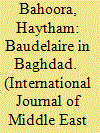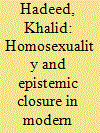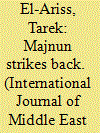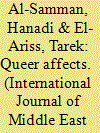|
|
|
Sort Order |
|
|
|
Items / Page
|
|
|
|
|
|
|
| Srl | Item |
| 1 |
ID:
125991


|
|
|
|
|
| Publication |
2013.
|
| Summary/Abstract |
During a revolutionary period of cultural production and anticolonial political commitment in 1950s Baghdad, the modernist poet Husayn Mardan was put on trial for his "obscene" collection entitled Qasa?id ?Ariya (Naked Poems). Heavily influenced by Baudelaire, Mardan's poetics provide a revolutionary paradigm focused on the gratification of the corporeal. This paper considers how Mardan's poetry, largely marginalized from the canonized modernist Arabic poetic tradition, registers resistance to an increasingly rationalized and bureaucratic social order through a transgressive poetics that displace the political onto the body. Lampooning social uprightness and middle-class sterility, Mardan's poems encourage sexual licentiousness, embrace the space of the brothel, and celebrate filth and germs. Through a consideration of Mardan's appropriation of Baudelaire, this essay theorizes the translation and transformation of Baudelaire's paradigmatic literary representations of modernity into the context of a modernizing Baghdad and therefore historicizes the appearance of modernist aesthetics in a non-European space.
|
|
|
|
|
|
|
|
|
|
|
|
|
|
|
|
| 2 |
ID:
125923


|
|
|
|
|
| Publication |
2013.
|
| Summary/Abstract |
In recent decades, Iran has witnessed radical transformations concerning the conceptualization of and procedural standards for changing sex. Psychologists, medical and legal practitioners, law enforcement officials, and scholars of fiqh have debated the advisability (in debates among health and legal professionals) or the permissibility (among scholars of fiqh) of sex-change. This article asks what historical transformations of the concept of jins/genus have informed the debates and enabled the contemporary dominant concepts and practices that shape them. How has jins come to mean sex and how does this matter? The article first maps out the historical genealogy of these reconfigurations. What were some of the 19th- and pre-19th-century concepts that could be considered disparate precedents to this cluster around sex/jins? It then reviews some of the late-19th- and 20th-century reshaping of biomedical knowledge and marital practices that have contributed to the contemporary meanings of jins.
|
|
|
|
|
|
|
|
|
|
|
|
|
|
|
|
| 3 |
ID:
125949


|
|
|
|
|
| Publication |
2013.
|
| Summary/Abstract |
In this paper I argue that representations of homosexuality in modern Arabic literature have tended to isolate it and contain its threat through a conceptual strai(gh)tjacket that I term "epistemic closure." I begin by analyzing Sa?d Allah Wannus's play Tuqus al-Isharat wa-l-Tahawwulat as an essentialist paradigm of closure, where a language of interiority and essence identifies male homosexuality with passivity and femininity, subordinated a priori to a sexually and socially dominant masculinity. Then, I examine ?Ala? al-Aswani's novel ?Imarat Ya?qubyan as a constructionist example of the same closure, in which homosexuality is explained through a narrative of abnormal development that circumscribes its diffuse potential. Finally, I read Huda Barakat's Sayyidi wa-Habibi as a "queer" novel that links homosexuality to the continuum of male homosocial desire, thereby disrupting the normative distribution of center and margin and suggesting a way out of the epistemic closure imposed on homosexuality.
|
|
|
|
|
|
|
|
|
|
|
|
|
|
|
|
| 4 |
ID:
125957


|
|
|
|
|
| Publication |
2013.
|
| Summary/Abstract |
This article examines the association of homosexuality with madness in two contemporary novels, Hanan al-Shaykh's Innaha London ya ?Azizi (Only in London) and Hamdi Abu Golayyel's (Julayyil) Lusus Mutaqa?idun (Thieves in Retirement). Through a comparative reading of the figure of Majnun, an impassioned lover and mad rebel, I argue that literary articulations of queer desire operate as embodied resistance to social and political normativity, both in the Arab world and in the diaspora. Discussing the aesthetic transformation of the contemporary novel and drawing on the Arab-Islamic literary and philosophical tradition, I critically engage Michel Foucault's reading of sexual and epistemological developments in light of current debates about Arab homosexuality. I show how discursive models of sexuality are situated in modernity's intertwinement with other structures of power and systems of belief, crossing cultural contexts and linguistic registers.
|
|
|
|
|
|
|
|
|
|
|
|
|
|
|
|
| 5 |
ID:
125731


|
|
|
|
|
| Publication |
2013.
|
| Summary/Abstract |
When we and several authors of the articles included here originally debated the idea of this special issue, our aim was to respond to what we perceived as a standstill that locks Middle Eastern queer studies into a premodern Eastern versus modern Western-oriented division. While the East is studied as a repository of tradition with an identifiable sexual and amorous nomenclature, the West is often presented as a fixed hegemonic structure distinct from the East, regardless of the long traditions of cultural exchange and the specific forms of translation and dialogue that take shape when the identities and models of desire associated with the West travel or are performed outside it or at its periphery. This division has generated a set of binaries pertaining to the applicability of terms (gay, lesbian, homosexual) and theoretical frameworks (queer theory) to Middle Eastern literary and cultural contexts. It is our belief that critical engagements with queer Arab and Iranian sexualities in literature and culture ought to situate current discussions in queer theory within debates and concerns arising from specific Middle Eastern social and political realities.
|
|
|
|
|
|
|
|
|
|
|
|
|
|
|
|
| 6 |
ID:
125943


|
|
|
|
|
| Publication |
2013.
|
| Summary/Abstract |
Faced with the possible censoring of the film adaptation of ?Imarat Ya?qubyan, the book's author, ?Ala? al-Aswani, responded, "Why aren't Italy, France, or the United States defamed by movies dealing with homosexuality?" Implicit in his defensive question is a perceived distinction between First World gay rights and social conservatism in the Third World. My paper considers this conventional coupling of gay rights and civilizational discourse in the global reception of ?Imarat Ya?qubyan. Against the author's remarks, I argue that the story is remarkable for staging an interplay between the putatively opposed characters of Hatim Rashid, an openly gay newspaper editor, and Taha al-Shazli, a young man lured into a terrorist group. By uniting these two characters along parallel tracks, ?Imarat Ya?qubyan queerly couples the seemingly antagonistic forces endemic to the civilizational discourse of gay rights and offers us a means for imagining new constellations of queer politics.
|
|
|
|
|
|
|
|
|
|
|
|
|
|
|
|
| 7 |
ID:
125934


|
|
|
|
|
| Publication |
2013.
|
| Summary/Abstract |
This article offers a reading of the groundbreaking book Bareed Mista3jil: True Stories, a collection of the narratives of Lebanese queers. Here, I argue, a burgeoning collective queer experience is being mapped from the conditions of Western imperialism and globalization, from the legacies of a colonial past, and from everyday life in postwar Lebanon. Resisting the urge to reduce Arab queer identities as either Western or traditionally Arab, the article suggests that though Western constructions of sexualities have certainly been influential, these identities are also responding to the local and cultural context. If we attune our readings to the affects that underlie the stories in this collection, it becomes clear that the emotional strategies to survive and negotiate the difficulties of postcoloniality are different from the strategies of post-Stonewall pride culture. Rather than stifle shame with the insistence of queer pride, this community is creating itself by expressing its suffering from the effects of shame and social humiliation. The narrative thread that comes through is not pride but hope. That is because shame, as Elspeth Probyn contends, gives access to what is most important and, as Eve Sedgwick has argued, is a resource for imagining change.
|
|
|
|
|
|
|
|
|
|
|
|
|
|
|
|
|
|
|
|
|